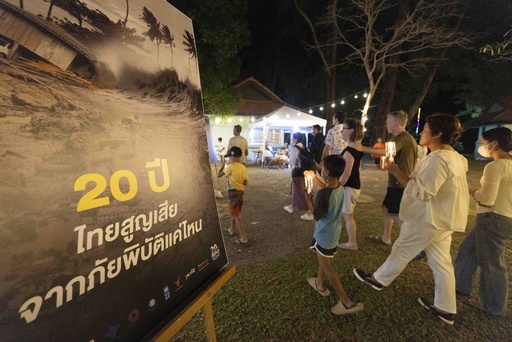BANDA ACEH, Indonesia — On Thursday, a somber atmosphere enveloped Indonesia’s Aceh province as hundreds of people came together to commemorate the 20th anniversary of the catastrophic Indian Ocean tsunami, a poignant event that ranks among the gravest natural disasters in modern times.
Many attendees expressed their grief as they visited a mass grave in Ulee Lheue village, where over 14,000 unidentified victims of the tsunami are laid to rest. Banda Aceh, the capital of this northern province, remains one of the areas most severely affected by the 9.1 magnitude earthquake that triggered the devastating tsunami.
Muhamad Amirudin, who lost two children in the disaster two decades ago, shared his sorrow while visiting the mass grave with his wife. “We miss them and we still don’t know where they are. All we can do is return to these graves each year to honor their memory,” he stated, reflecting on their ongoing search for closure.
The massive earthquake off the coast of Sumatra occurred on December 26, 2004, unleashing a tsunami that resulted in around 230,000 fatalities across multiple nations, with the effects reaching as far as East Africa. The disaster left approximately 1.7 million people displaced, particularly in Indonesia, Sri Lanka, India, and Thailand, which were the countries hit hardest. Indonesia alone mourned the loss of over 170,000 lives.
Even after two decades, the effects of this tragedy remain palpable in Indonesia, where survivors continue to grieve their lost family members. In downtown Banda Aceh, hundreds gathered to pray at the Baiturrahman Mosque and observed a moment of silence as sirens echoed throughout the city for three minutes, the precise duration of the earthquake.
In terms of rebuilding efforts, Aceh has made significant infrastructural progress since the tsunami, with the construction of more resilient buildings and the establishment of early warning systems designed to alert coastal residents of potential tsunamis, giving them crucial time to evacuate. These recovery efforts have been bolstered by substantial contributions from international organizations and donors, leading to the reconstruction of schools, hospitals, and vital infrastructure.
Mamers were also observed in Thailand, especially in Ban Nam Khem—a small fishing village in Phang Nga province—where the effects of the tsunami were devastating. Here, the memorial ceremony saw attendees coming together to remember the more than 8,000 lives lost in the country, many of whom remain unaccounted for. As mourners laid flowers at the village’s tsunami memorial, around 300 people participated in the ceremony, which incorporated prayers from various faiths—Muslim, Christian, and Buddhist—reflecting the multicultural fabric of the nation.
Urai Sirisuk, who lost her 4-year-old daughter in the tragedy, expressed her struggle to reconcile her pain. “I avoid the memorial park throughout the year because every visit brings back a tidal wave of emotions. The sea took my child, and I find it hard to forgive,” she revealed. Yet, she feels a profound connection that calls her back: “I can still hear her voice; I cannot forsake her memory. I must be here for my child.”
In India, hundreds convened at Marina Beach in Chennai to pay tribute to those lost. They performed rituals, pouring milk into the ocean and offering flowers in a moving tribute accompanied by rhythmic drum sounds. Official statistics note that 10,749 individuals were killed in India, with nearly 7,000 casualties recorded in Tamil Nadu alone. “Twenty years have passed, but we gather here to honor their memories,” said 69-year-old Sadayammal.
Meanwhile, in Sri Lanka, residents and family members of victims convened at the coastal village of Pereliya, placing flowers at a memorial for nearly 2,000 passengers who perished when the tsunami struck their train, the Queen of the Sea. Among them was Anura Ranjith, who mourned the loss of his younger sister and her daughter, whom he has not seen since that fateful day. “The pain of their loss is enduring, and I feel the void every single day,” he lamented.
The tsunami claimed over 35,000 lives in Sri Lanka, and on this day, people throughout the country observed two minutes of silence in memory of those who perished.



